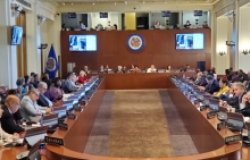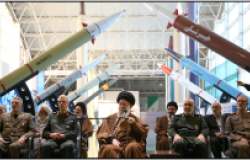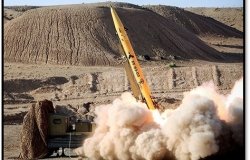Eastern Mediterranean Security Conference II
Western Policy Center, in conjunction with the National Defense University , organizes the second Eastern Mediterranean Security Conference.
Overview
For Immediate Release
October 30, 2001
Contact: 202-530-1425
Greek & Turkish Military Officers, Strategists Convene to Review Bilateral / Regional Security Issues, War on Terrorism
Washington, D.C. - The Western Policy Center today launched the second Eastern Mediterranean Security Conference, an independent and unofficial project Pinging together active and retired Greek, Turkish, and U.S. military officers, diplomats, and security analysts to review Eastern Mediterranean security issues, explore the roles of the respective militaries in improving relations between Greece and Turkey, and examine opportunities for stepped-up regional cooperation in the war against global terrorism.
The conference will take place October 31-November 1, in conjunction with the National Defense University (NDU), the premier U.S. institution for joint professional military education, research, and international engagement activities.
"The Western Policy Center continues its work in advancing the security dialogue between two strategically important NATO allies in southeastern Europe," said Executive Director John Sitilides. "We look forward to the opportunity to build greater understanding and communication between the Greek and Turkish militaries, to further rapprochement between the two allies, and to advance regional security, stability, and democratization objectives in the Balkans, the eastern Mediterranean, the Caucasus, and the Middle East."
The four areas of discussion involve Kosovo/FYR-Macedonia stability, regional counter-terrorism, Aegean confidence-building measures, and a new Cyprus security architecture.
The Greek delegation consists of Dr. Stelios Alifantis, Professor at Panteion University and former Special Advisor to the Minister of Defense; Vice Admiral Antonios Filippou, Hellenic Navy, Ret., former Chief of Policy, Hellenic General Staff; and Dr. Sergios Zambouras, Senior Fellow at the Foundation for Mediterranean Studies and Member of the Scientific Committee, Hellenic Ministry of National Defense.
The Turkish delegation consists of Major General Armagan Kuloglu, Turkish Army, Ret., Head of Geopolitics and Strategic Studies, Center for Eurasian Strategic Studies; Dr. Umit Ozdag, Chairman, Center for Eurasian Strategic Studies; and Vice Admiral Turhan Ozer, Turkish Navy, Ret., former Commander, Sea Area North, and Advisor to the Prime Minister.
Each delegation will be accompanied by its respective Washington, D.C. attaché team.
The U.S. delegation consists of Amb. Thomas Weston, Special State Department Coordinator for Cyprus; Deputy Assistant Secretary of Defense Dr. Mark Schneider (ballistic missile defense); and Puce Hardcastle, Defense Intelligence Agency (counter-terrorism policy).
Col. Stephen Norton and Lt. Col. Harry Dinella of the Western Policy Center will oversee the panel discussions, along with Dr. Judith Yaphe of NDU's Institute for National Strategic Studies. They will be joined by Dr. Ian O. Lesser, RAND; Anthony Blinken, Senior Fellow at the Center for Strategic and International Studies and former European Affairs Director, National Security Council; Admiral T. Joseph Lopez, U.S. Navy, Ret., former Commander in Chief, Allied Forces, Southern Region (NATO); and Amb. James A. Williams, former Special State Department Coordinator for Cyprus.
Hosted By

Global Europe Program
The Global Europe Program is focused on Europe’s capabilities, and how it engages on critical global issues. We investigate European approaches to critical global issues. We examine Europe’s relations with Russia and Eurasia, China and the Indo-Pacific, the Middle East and Africa. Our initiatives include “Ukraine in Europe” – an examination of what it will take to make Ukraine’s European future a reality. But we also examine the role of NATO, the European Union and the OSCE, Europe’s energy security, transatlantic trade disputes, and challenges to democracy. The Global Europe Program’s staff, scholars-in-residence, and Global Fellows participate in seminars, policy study groups, and international conferences to provide analytical recommendations to policy makers and the media. Read more
Thank you for your interest in this event. Please send any feedback or questions to our Events staff.










